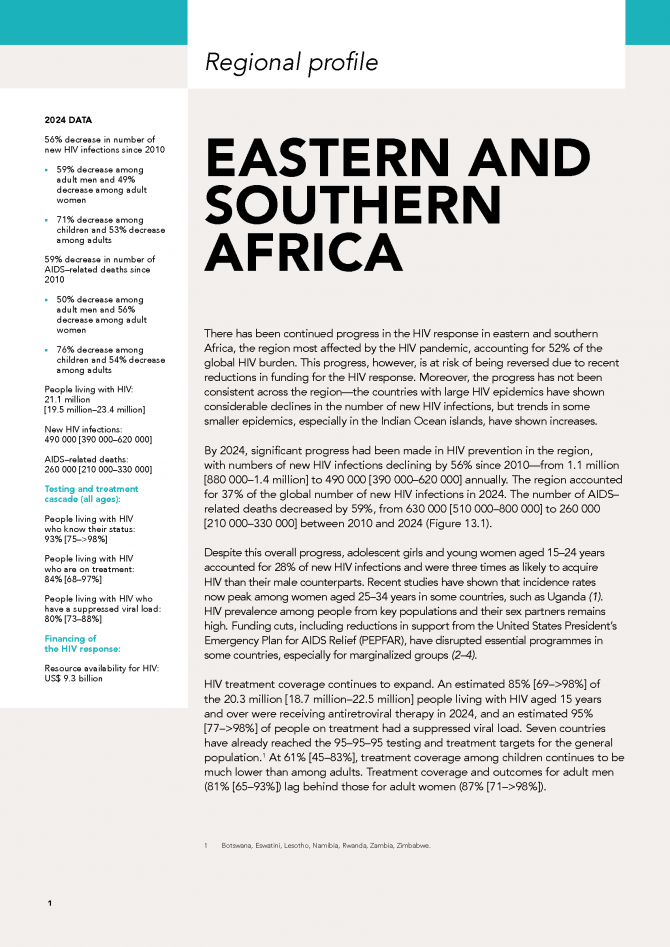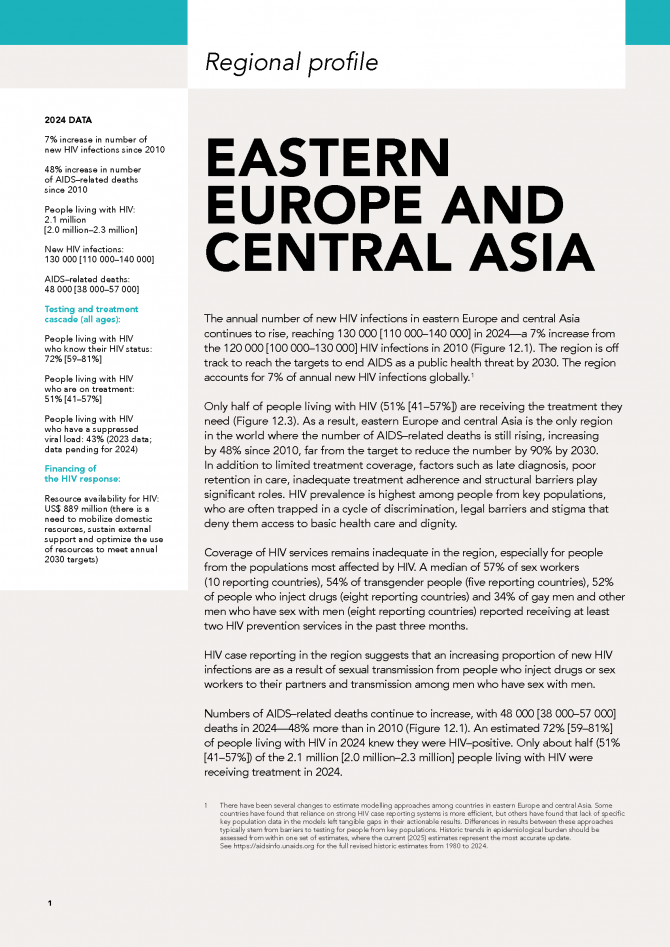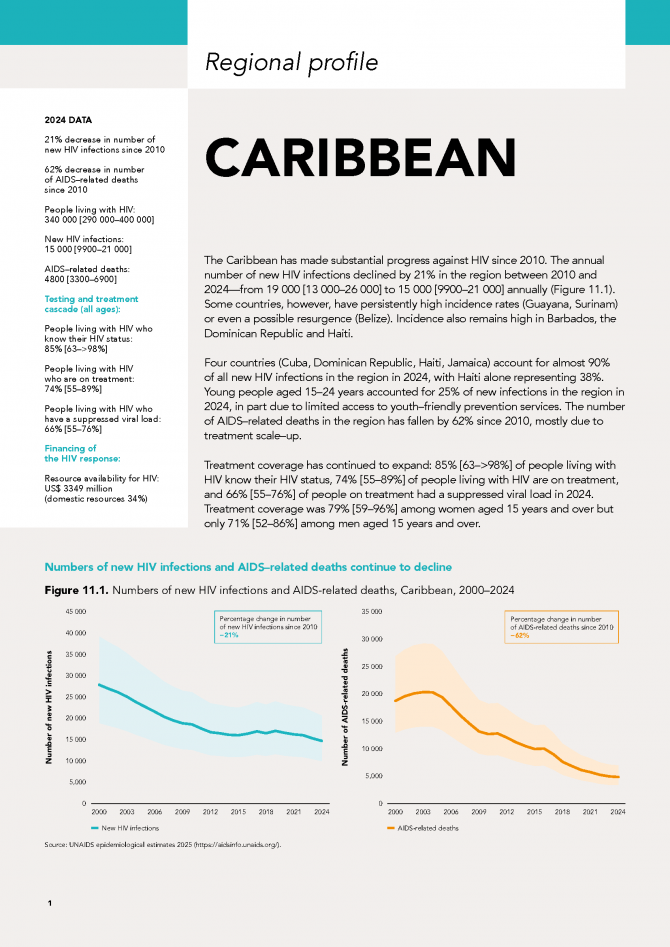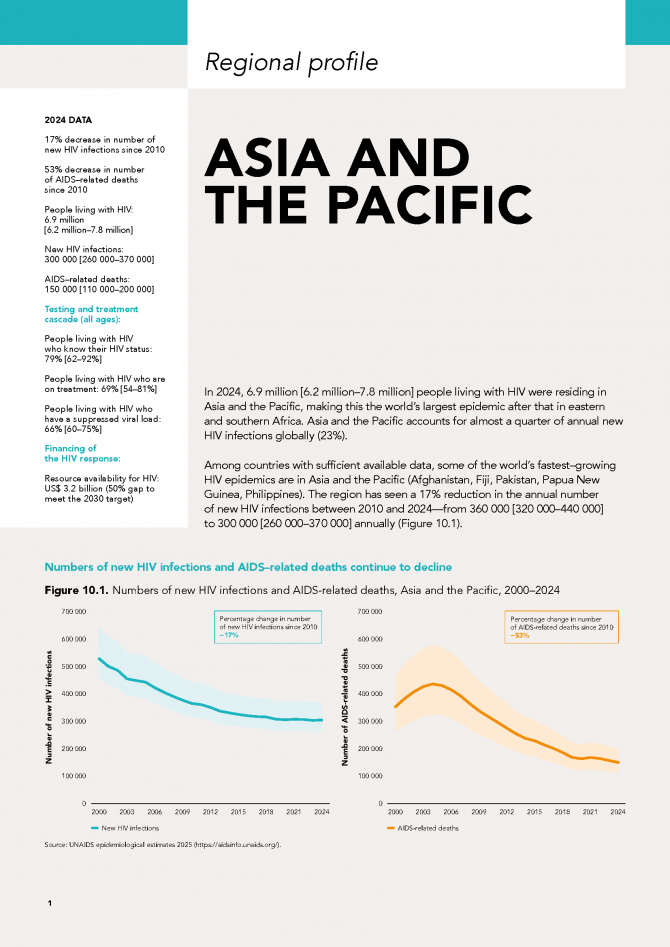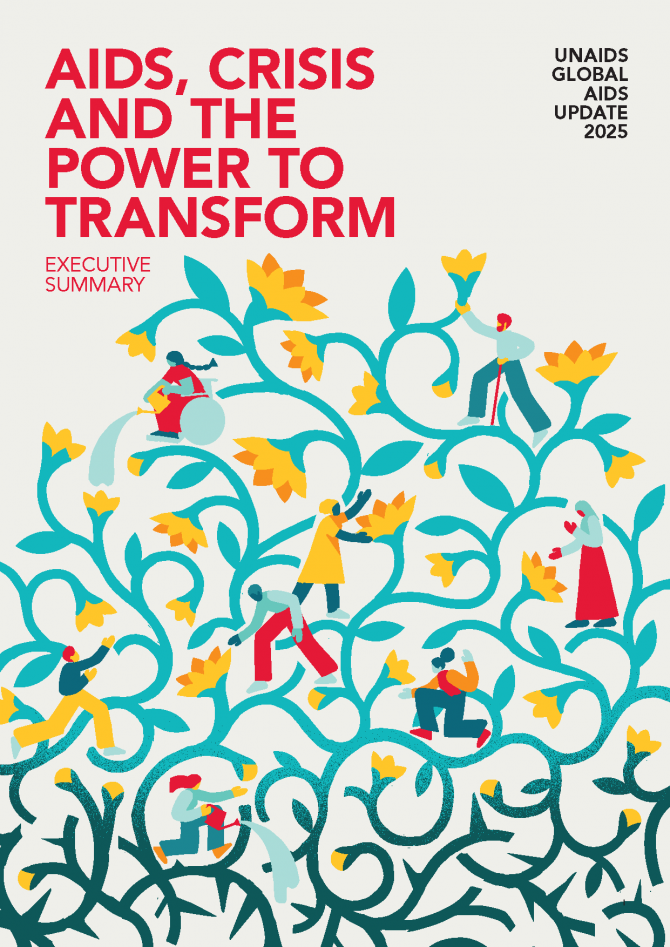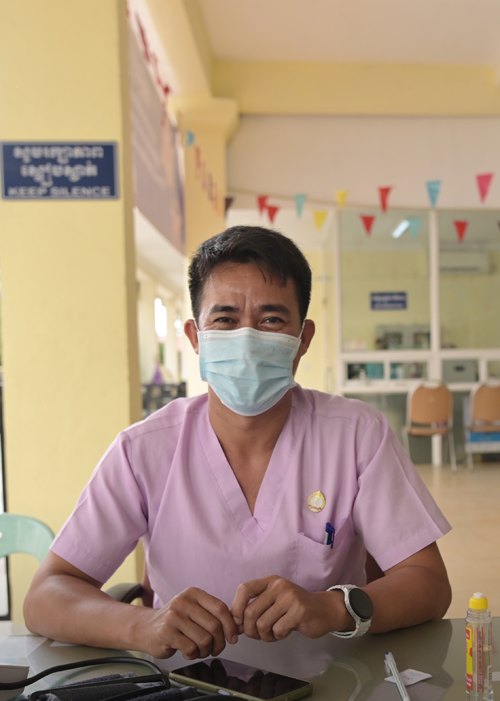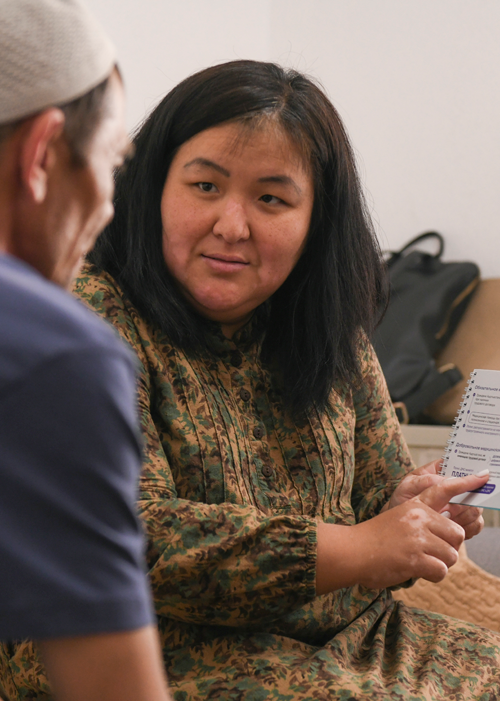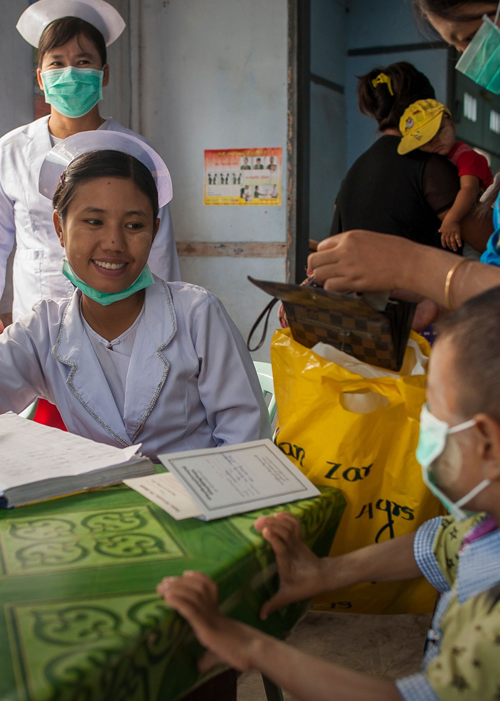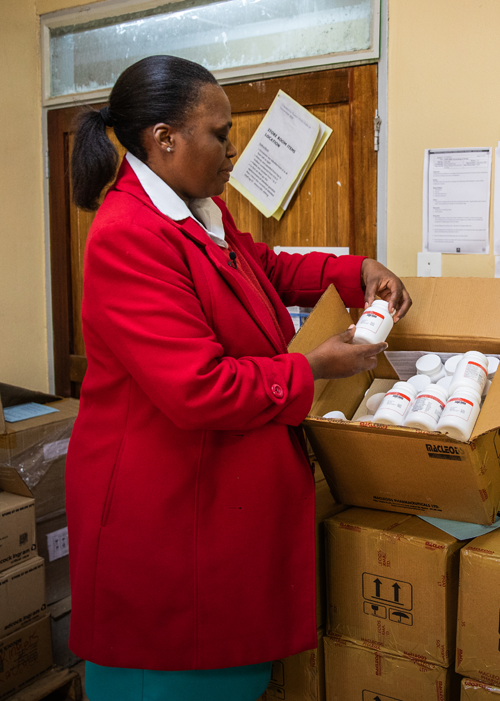Documents
Executive summary — 2025 Global AIDS Update — AIDS, Crisis and the Power to Transform
10 July 2025
A historic funding crisis is threatening to unravel decades of progress unless countries can make radical shifts to HIV programming and funding. The report highlights the impact that the sudden, large-scale funding cuts from international donors are having on countries most affected by HIV. Yet it also showcases some inspiring examples of resilience, with countries and communities stepping up in the face of adversity to protect the gains made and drive the HIV response forward.

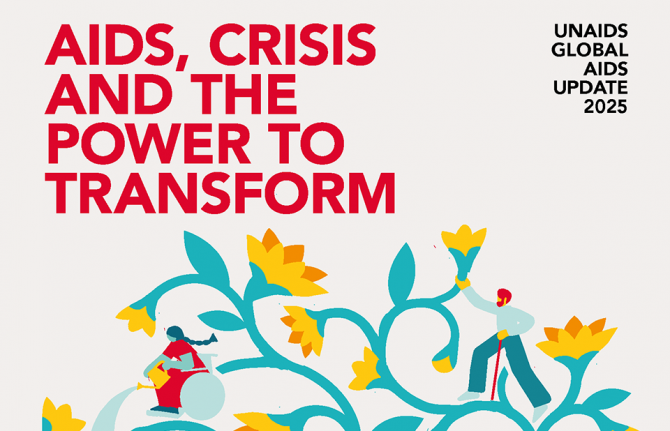
Press Release
Countries must urgently step up to transform their HIV responses amid an international funding crisis that risks millions of lives
10 July 2025 10 July 2025GENEVA/JOHANNESBURG, 10 July 2025—UNAIDS today launched its 2025 Global AIDS Update, AIDS, Crisis and the Power to Transform, which shows that a historic funding crisis is threatening to unravel decades of progress unless countries can make radical shifts to HIV programming and funding.
The report highlights the impact that the sudden, large-scale funding cuts from international donors are having on countries most affected by HIV. Yet it also showcases some inspiring examples of resilience, with countries and communities stepping up in the face of adversity to protect the gains made and drive the HIV response forward.
Some 25 of the 60 low and middle-income countries included in the report have indicated increases in domestic budgets for their HIV responses in 2026. The estimated collective rise among the 25 countries amounts to 8% over current levels, translating to approximately USD 180 million in additional domestic resources. This is promising, but not sufficient to replace the scale of international funding in countries that are heavily reliant.
A global emergency: massive cuts and weakening of aid consensus threaten to reverse progress
Despite marked progress in the HIV response in 2024, the weakening aid consensus and significant and abrupt funding shortfalls in the HIV response in 2025 have triggered widespread disruption across health systems and cuts to frontline health workers—halting HIV prevention programmes and jeopardizing HIV treatment services.
In Mozambique alone, over 30 000 health personnel were affected. In Nigeria, pre-exposure prophylaxis (PrEP) initiation has plummeted from 40 000 to 6000 people per month. If US-supported HIV treatment and prevention services collapse entirely, UNAIDS estimates that an additional 6 million new HIV infections, and 4 million additional AIDS-related deaths could occur between 2025 and 2029.
“This is not just a funding gap—it’s a ticking time bomb,” said UNAIDS Executive Director Winnie Byanyima. “We have seen services vanish overnight. Health workers have been sent home. And people—especially children and key populations—are being pushed out of care.”
Even before the large-scale service disruptions, the reported data for 2024 shows that 9.2 million people living with HIV were still not accessing life-saving treatment services last year. Among those were 620 000 children aged 0—14 years living with HIV but not on treatment which contributed to 75 000 AIDS-related deaths among children in 2024.
In 2024, 630 000 people died from AIDS-related causes, 61% of them in sub-Saharan Africa. Over 210 000 adolescent girls and young women aged 15—24 acquired HIV in 2024—an average of 570 new infections every day.
HIV prevention services are severely disrupted. Community-led services, which are vital to reaching marginalized populations, are being defunded at alarming rates. In early 2025, over 60% of women-led HIV organizations surveyed had lost funding or were forced to suspend services. The United States President’s Emergency Plan for AIDS Relief (PEPFAR) reached 2.3 million adolescent girls and young women with comprehensive HIV prevention services in 2024 and enabled 2.5 million people to use HIV PrEP—many of these programmes have now stopped completely.
Meanwhile, the rise in punitive laws criminalizing same-sex relationships, gender identity, and drug use is amplifying the crisis, making HIV services inaccessible. Countries like Uganda, Mali and Trinidad and Tobago have seen recent harmful and discriminatory changes to their criminal laws targeting key populations, pushing them further from care and dramatically raising their risk of acquiring HIV.
A beacon of hope: countries and communities are stepping up to protect essential HIV treatment gains and progress is being made
South Africa currently funds 77% of its AIDS response and its 2025 budget review includes a 5.9% annual increase in health expenditure over the next three years, including a 3.3% annual increase for HIV and tuberculosis programmes. The government intends to finance the development of a patient information system, a centralized chronic medicine dispensing and distribution system, and a facility medicine stock surveillance system.
As of December 2024, seven countries—Botswana, Eswatini, Lesotho, Namibia, Rwanda, Zambia, and Zimbabwe—had achieved the 95-95-95 targets: 95% of people living with HIV know their status, 95% of those are on treatment, and 95% of those on treatment are virally suppressed. These successes must be maintained and further scaled up.
The report also highlights the emergence of unprecedented, highly effective new prevention tools like long-acting injectable PrEP, including Lenacapavir, which has shown near-complete efficacy in clinical trials—though affordability and access remain key challenges.
“There is still time to transform this crisis into an opportunity,” said Ms. Byanyima. “Countries are stepping up with domestic funding. Communities are showing what works. We now need global solidarity to match their courage and resilience.”
A call for solidarity
The 2025 Global AIDS Update concludes with an urgent call: the global HIV response cannot rely on domestic resources alone. The international community must come together to bridge the financing gap, support countries to close the remaining gaps in HIV prevention and treatment services, remove legal and social barriers, and empower communities to lead the way forward.
UNAIDS emphasizes that every dollar invested in the HIV response not only saves lives but strengthens health systems and promotes broader development goals. Since the start of the epidemic, 26.9 million deaths have been averted through treatment, and 4.4 million children protected from HIV infection through vertical transmission prevention.
“In a time of crisis, the world must choose transformation over retreat,” said Ms Byanyima. “Together, we can still end AIDS as a public health threat by 2030—if we act with urgency, unity, and unwavering commitment.”
UNAIDS report is being launched ahead of the Scientific AIDS Conference IAS 2025 taking place in Kigali, Rwanda, from 13-17 July 2025.
UNAIDS
The Joint United Nations Programme on HIV/AIDS (UNAIDS) leads and inspires the world to achieve its shared vision of zero new HIV infections, zero discrimination and zero AIDS-related deaths. UNAIDS unites the efforts of 11 UN organizations—UNHCR, UNICEF, WFP, UNDP, UNFPA, UNODC, UN Women, ILO, UNESCO, WHO and the World Bank—and works closely with global and national partners towards ending the AIDS epidemic by 2030 as part of the Sustainable Development Goals. Learn more at unaids.org and connect with us on Facebook, Twitter, Instagram and YouTube.
Contact
UNAIDSSophie Barton Knott
tel. +41 79 514 6896
bartonknotts@unaids.org
UNAIDS
Michael Hollingdale
tel. +41 79 500 2119
hollingdalem@unaids.org

